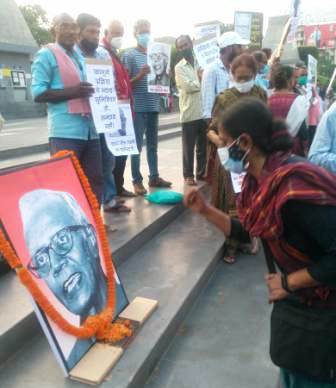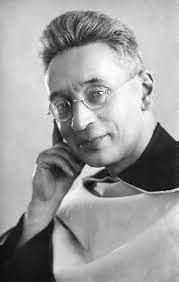[Speak Truth to Power and Pay the Price! That’s the mission of a true journalist. This is what Jesuit social activist and social commentator Father Cedric Prakash seems to be saying in his latest epistle. Read on:]
These are critical times in India’s history: in fact, whether we would like to accept it or not, it is a break or make moment! At stake is the future of Indian democracy based on the visionary Constitution of India, rooted in the four ‘non-negotiables’ of justice, liberty equality and fraternity; at the stake is the sanctity of the pluralistic fabric of a nation ensconced in the inviolable dignity of every Indian: child, woman and man; at stake are the fundamental rights protected and guaranteed to every single citizen of India; at stake is the very idea, wealth and beauty of India!
Fascists are known for their highly manipulative strategies which are meticulously planned. Top on their priority list is to throttle freedom of speech and expression, to curb every form of dissent and to do all they can to hide the plain truth and grim reality. They leave no stone unturned in order to attain their insidious ends: they threaten, they co-opt, they compromise, they foist false cases, they intimidate and harass, use draconian laws like the UAPA to curb dissent; they misuse official agencies like the ED, the NIA, the CBI and even the police, to hound those who take visible and vocal stands; they incarcerate and even kill. It is not easy for journalists in India today to speak truth to power: journalism is under great duress!
It was no great surprise that in the World Press Freedom Index, 2023, released last May, that India fell to an abysmal low rank of 161 out of 180 countries; slipping eleven notches from its previous ranking. Press freedom in India is much worse than even its neighbours Pakistan and Sri Lanka.
Once the fourth pillar of democracy is throttled, made subservient to the whims and facies of the political masters, it does not leave much of an imagination to realise, that more than half the battle is lost.
WPI minces no words
The World Press Index 2023, minces no words commenting on the pathetic state of the press in India: “the violence against journalists, the politically partisan media and the concentration of media ownership all demonstrate that press freedom is in crisis in “the world’s largest democracy”, ruled since 2014 by Prime Minister Narendra Modi, the leader of the Bharatiya Janata Party (BJP) and the embodiment of the Hindu nationalist right.”
The highly professional and authentically objective report says: “with an average of three or four journalists killed in connection with their work every year, India is one of the world’s most dangerous countries for the media. Journalists are exposed to all kinds of physical violence including police violence, ambushes by political activists, and deadly reprisals by criminal groups or corrupt local officials. Supporters of Hindutva, the ideology that spawned the Hindu far right, wage all-out online attacks on any views that conflict with their thinking.
“Terrifying coordinated campaigns of hatred and calls for murder are conducted on social media, campaigns that are often even more violent when they target women journalists, whose personal data may be posted online as an additional incitement to violence. The situation is also still very worrisome in Kashmir, where reporters are often harassed by police and paramilitaries, with some being subjected to so-called “provisional” detention for several years.”
Where then, do Catholic journalists stand, in the wake of the onslaught that media in India in general? Do they have the courage to exercise the prophetic mission to speak truth to power? Or have they also succumbed to the fears and duress to which media in general has fallen to? Rhetorical Questions, because the answers are obvious!
By and large (barring a few notable exceptions) Catholic journalists and the Catholic media in general, have abdicated their responsibility of speaking truth to power!
In January 2004, the General Assembly of the Catholic Bishops’ Conference of India (CBCI) held in Thrissur, Kerala, produced a path-breaking statement, ‘Called to be a Communicating Church’ in which they highlighted “that media have a prophetic role, indeed a vocation: to speak out against the false gods and ideals of the day — materialism, hedonism, consumerism and narrow nationalism”.
The statement called for a Pastoral Plan for Communications which was meant to be implemented in every Diocese in India. How many of our Dioceses are today actually implementing this plan with empowered Communications Commissions (and with lay members) to monitor them? How many have spokespersons, particularly in the local languages?
It is true that journalism today, is under duress. But should Catholic journalists also enter this comfort zone and continue with their projects, productions and ‘feel-good’ ‘sitting-on-the-fence’ communications? Don’t they have the moral and non-negotiable responsibility of responding to the cries of the poor and the vulnerable, the excluded and exploited, the marginalized and the minorities of the country?
Courage and the Catholic Journalist
How many have written incisive articles on the reality which is destroying Manipur and the victimization of the Muslims of Haryana? How many have written/done productions against the sedition, the UAPA and other draconian laws? the illegal incarceration of human rights defenders? the unconstitutional abrogation of Articles 370 and 35A regarding Kashmir?
Has there been any concerted effort to rubbish false propaganda movies like the ‘Kashmir Files’ or the ‘Kerala Story’? the anti-conversion laws? the three farm bills and the labour codes? the monstrous and extravagant Central Vista project?
The mining mafia which is looting the country of its natural resources and denying the Adivasis of their jal, jungle aur jameen? what about the legitimate rights of the Dalits, LGBTQI and other vulnerable communities? the growing unemployment and spiralling prices? and much more?
Catholic journalists must have the prophetic courage to take on the fascist and fundamentalist forces which are working overtime, to destroy the sanctity of the Constitution and the secular, pluralistic fabric of our beloved nation.
Titus Brandsma: Role Model
Indian Catholic journalists could take a cue from, and be inspired by St Titus Brandsma. St. Titus, a Dutch Carmelite priest, was a fearless, prophetic journalist. He was spiritual adviser to the Dutch Association of Catholic Journalists in 1935 and became its president after the Nazi invasion of the Netherlands.
He worked with the Dutch bishops’ in crafting their message opposing Nazi ideology and the forced publication of propaganda in Catholic newspapers. Following Germany’s invasion of the Netherlands in 1940, Brandsma defended the freedom of Catholic education and the Catholic press against Nazi pressure.
In the face of great risk, he visited the offices of Catholic media outlets around the country over the course of ten days, encouraging editors to resist pressure to publish Nazi propaganda. His actions drew the ire of the Nazi regime who arrested him in 1942.
Several months later, he was transported to the Dachau concentration camp where he was killed by a lethal injection of carbolic acid. He had to pay the ultimate price for his visible and vocal stand against Nazism.
St. John Paul II, who beatified him on 3 November 1985, defined Brandsma as a “valiant journalist” and a “martyr of freedom of expression against the tyranny of the dictatorship.”
The poem ‘Freedom’ of our Nobel laureate Rabindranath Tagore, should inspire Catholic journalists to move into a more meaningful and fearless realm:
Freedom from fear is the freedom
I claim for you, my motherland!
Freedom from the burden of the ages, bending your head,
breaking your back, blinding your eyes to the beckoning
call of the future;
Freedom from the shackles of slumber wherewith
you fasten yourself in night’s stillness,
mistrusting the star that speaks of truth’s adventurous paths;
freedom from the anarchy of destiny
whole sails are weakly yielded to the blind uncertain winds,
and the helm to a hand ever rigid and cold as death.
Freedom from the insult of dwelling in a puppet’s world,
where movements are started through brainless wires,
repeated through mindless habits,
where figures wait with patience and obedience for the
master of show,
to be stirred into a mimicry of life.
It is certainly not easy to be a journalist in India today: one thing is clear, that if you stick your neck out, if you are visible and vocal, if you stand up for truth and justice; you will have to pay the price: and that price is heavy indeed! It is however worth it, for the future of our country! Brandsma and Tagore show the way!
Fr. Cedric Prakash SJ is a human rights, reconciliation and peace activist/writer. He is the recipient of several international and national awards including ICPA’s ‘Louis Careno Award’ in 2021.
THE OPINIONS EXPRESSED IN THE ARTICLE ABOVE ARE ENTIRELY THOSE OF THE AUTHOR AND ARE NOT NECESSARILY THE OPINION OF THE EDITOR AND STAFF OF NEWSNET ONE.






An eye opener for many. But the dilemma is there. Who are the Catholic Journalists? As a priest, what is your identity? As a Catholic church run media, how do you navigate between spiritual and temporal matters?